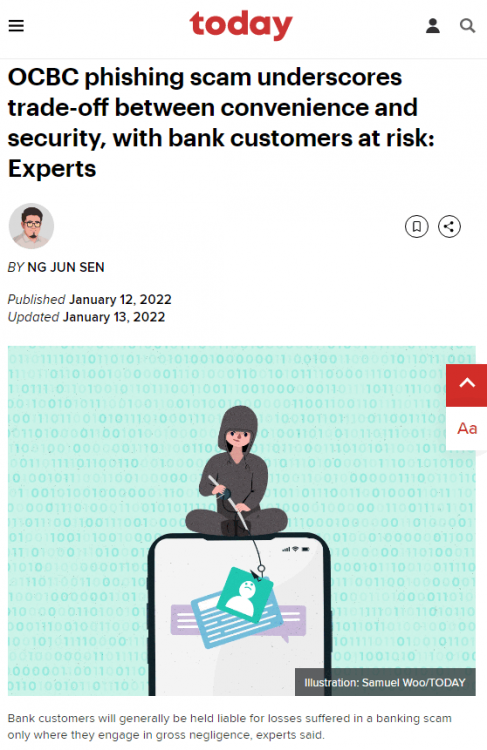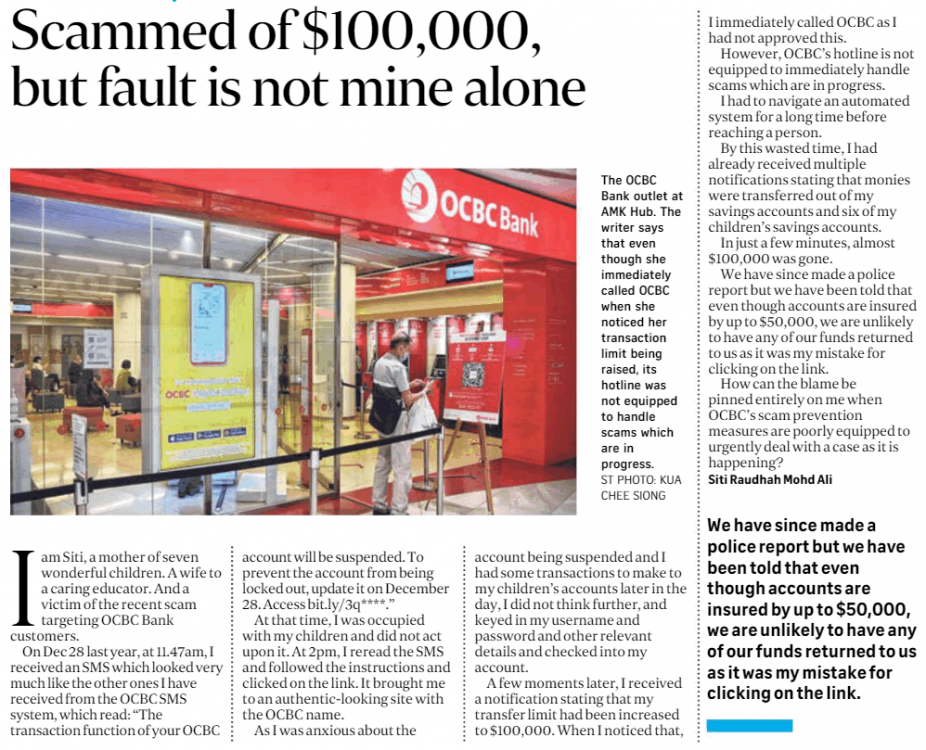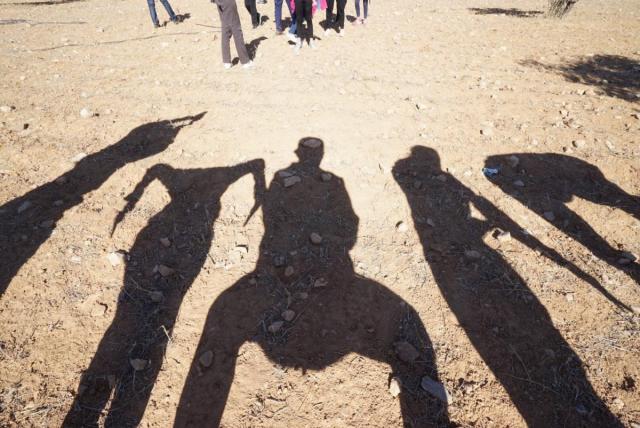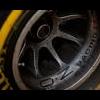Search the Community
Showing results for tags 'bank'.
-
Let's start with this https://www.straitstimes.com/singapore/courts-crime/ocbc-bank-customer-lost-120k-in-fake-text-message-scam-another-had-250k-stolen Young couple lost $120k in fake text message scam targeting OCBC Bank customers SINGAPORE - It took a man and his wife five years to save about $120,000, but in just 30 minutes, scammers using a fake text message stole the money they had kept in their OCBC Bank joint savings account. The couple in their 20s were among at least 469 people who reportedly fell victim to phishing scams involving OCBC in the last two weeks of December last year. The victims lost around $8.5 million in total. The husband works in the e-commerce sector, while his wife is in the hospitality industry. The man said he received the phishing message with a link at around noon on Dec 21 last year. A 38-year-old software engineer who fell prey to the same scam on Dec 28 told ST that he lost about $250,000 he had been saving since 2010. The father of a young child with special needs said the loss has been devastating, and he has been hiding it from his family. The bank said it has since halted its plans to phase out physical hardware tokens by the end of March this year, and has also stopped sending SMSes with links in them in the light of the spate of phishing incidents. Cyber security expert Anthony Lim, who is also a fellow at the Singapore University of Social Sciences, said scammers have advanced software enabling them to spoof telecommunications services and send SMSes that appear in the same threads used by real organisations. He added that even if victims did not provide their one-time passwords (OTPs), they would have sealed their fate when they entered other bank details on the fraudulent sites. "Once the victim unwittingly responds by entering the bank account credentials, the hackers' technologies can divert and capture a copy of the SMS OTP issued by the bank," he said.
-
Hi all, as above question........ say i got $50k cash, which FD account has highest interest? pls dun tell me about whatever investment scheme or whatnot.... not interested in investments for this sum of $$.
-
why "discontinue" the physical token and only accept phone apps it's safe ... got 2FA isn't if insist using physical token, the scammer would not be able to add NEW PAYEE and raise LIMIT to transfer money out ... FAST can transfer $200K chop chop curry pop ... don't play play
-
HI, Everytime i try to call in to UOB bank to make a enquiry the average waiting time could be more than 30min and still noone pick up the phone line 1800-2222 121. The service is really bad. Anyone has the same experience?
-
One of the magnates of our nation RIP Banking tycoon, former UOB chairman Wee Cho Yaw dies aged 95 https://www.straitstimes.com/singapore/uob-s-wee-cho-yaw-dies-aged-95
-
OCBC reports outage for all its banking services due to 'network issues' SINGAPORE: All OCBC banking services were down on Monday (Aug 28) due to "network issues", said the bank on its website. The bank acknowledged the issues in a Facebook post at about 9.40am, saying that it is facing "technical problems with our systems impacting our banking channels", which include mobile and online banking, PayNow, ATMs, Velocity and cards. An announcement on OCBC's website said that all banking services were down. "We are experiencing network issues at the moment. All of our banking services are down," said OCBC. "We are sorry for the inconvenience and are working to bring things back to normal." Commenting on OCBC's Facebook post, some customers noted that their credit card payments were declined and that they were unable to withdraw cash. One customer said in a comment in OCBC's Facebook post that her payment for an online doctor consultation could not go through. Another said: "Have breakfast with a client, used credit card and then atm card to pay bills, all declined." Several also said that it was embarrassing for them when their credit card transactions were declined. OCBC said that customers can still visit its branches for urgent transactions. CNA has reached out to OCBC for more information. https://www.channelnewsasia.com/singapore/ocbc-banking-services-down-outage-all-services-down-atms-paynow-cards-3728906 OCBC ah OCBC ...
-
https://www.straitstimes.com/asia/se-asia/robbers-blow-up-atm-flee-with-more-than-100000-in-malaysia SHAH ALAM – Three masked robbers took just five minutes to blow open an automated teller machine (ATM) at an Ambank branch in Setia Alam, Selangor. They escaped with RM349,000 (S$106,000) in cash. Shah Alam police officer Mohd Iqbal Ibrahim said he was alerted to the incident at 6.48am on Thursday, reported New Straits Times. “Our probe identified three suspects who were seen entering the premises. They arrived in a white car suspected to be a Mitsubishi ASX,” he said. “The surveillance recordings were blurry and unclear, as it had been sprayed with black paint. “We are on the hunt for the suspects,” he was quoted as saying in New Straits Times. He added that two ATMs, valued at around RM60,000, were damaged but only one was blasted open and broken into. They were likely blown up using gas pressure, according to preliminary investigations. In February 2022, two robbers made off with RM260,000 in cash after blowing up an ATM at a convenience store in Meru, Selangor. Police said the robbers blew open the machine using a type of gas via a pipe from their car, which was parked outside the store, reported The Star. In August 2019, another similar theft was reported in Tanjong Malim, Perak. Robbers blew up an ATM machine using explosive substances and fled with RM300,000, according to the Malay Mail.
-
I'm looking to change my bank home loan. (private housing) based on today's interests rate, anyone can recommend a bank who can offer a better deal? Income level and other criteria, sure meet the requirements. Loan amt, only $930k Current bank is UOB on FD rate package.
-
https://edition.cnn.com/2022/06/23/economy/china-bank-runs-protests-intl-mic-hnk/index.html Small banks in China are running into trouble. Savers could lose everything By Laura He, CNN Business Updated 0305 GMT (1105 HKT) June 24, 2022 Hong Kong (CNN Business)Peter had put his life savings of about $6 million into accounts at three small banks in China's central Henan province. He says he hasn't been able to access them since April. The 45-year-old entrepreneur asked us to call him Peter for security reasons. He's from the eastern city of Wenzhou and is just one of thousands of depositors who have been fighting to recover their savings from at least six banks in rural provinces in central China. "I'm close to having a nervous breakdown. I can't sleep," Peter told CNN Business. When he tried to access his accounts online, a statement would pop up on the homepage informing him that the website was under maintenance and services would be unavailable for a while, Peter told CNN Business. Two months later, those services have not been restored. The trouble began in April, when four banks in Henan suspended cash withdrawals. In China, local banks are only permitted to obtain deposits from their home customer base, but authorities say that "third-party platforms" were used to acquire funds from depositors outside the region. In Peter's case, for example, his hometown is over 700 miles away from the banks in Henan. The national banking regulator has accused a major shareholder of the four banks of illegally attracting money from savers. "Henan New Fortune Group, a shareholder of the four village banks, has illegally absorbed the public's funds through internal and external collusion, the use of third-party platforms, and fund brokers," the China Banking and Insurance Regulatory Commission told state-run Xinhua News Agency in May. Depositors protest in front of the Henan branch of the China Banking and Insurance Regulatory Commission, demanding their money back after their funds were frozen. "The police have opened a case for investigation into the matter," it added. Runs on small Chinese banks have become more frequent in recent years and some have been accused of financial improprieties or corruption. But experts worry that a much bigger financial problem could be looming, caused by fallout from a real estate crash and soaring bad debts related to the Covid-19 pandemic. There are no official estimates yet on the total amount of funds that bank depositors are unable to withdraw. CNN Business did not receive a comment from the local police or the national banking regulator. As many as 400,000 banking customers across China were unable to access their savings, according to an estimate in April by Sanlian Lifeweek, a state-owned magazine. That's a drop in the ocean of China's vast banking system, but about a quarter of the industry's total assets are held by around 4,000 small lenders, which often have opaque ownership and governance structures and are more vulnerable to corruption, say experts, and the sharp economic slowdown. "The scope of the bank scandals where bank officials embezzle and steal funds from depositors is alarming, and what is exposed could only be the tip of the iceberg," said Frank Xie, a professor at University of South Carolina Aiken who studies Chinese business and the economy. "As the Chinese economy slows down further, the fiscal shortage worsens, and the debt repayments become more widespread among Chinese companies, especially in the real estate sector, bank runs could become more often and on a larger scale," he said. Many savers have had enough. Late last month, hundreds of depositors traveled to Zhengzhou, the capital of Henan, to protest outside the office of the banking regulator and to demand their money back, to no avail. Another protest was planned in June. But as the depositors arrived in Zhengzhou, they were stunned to find that their health codes — which were green upon departure — had turned red, according to six people who spoke with CNN and social media posts. Anyone with a red code — usually assigned to people infected with Covid or deemed by authorities to be at high risk of infection — immediately becomes persona non grata. They are banned from all public venues and transport and are often subject to weeks of government quarantine. CNN has reached out to the Zhengzhou government for comment. The Henan Provincial Health Commission told state-run news website thepaper.cn it was "investigating and verifying" the complaints from depositors who received red codes. What's behind the problem in Henan In Henan, the China Banking and Insurance Regulatory Commission has put the blame on the private investment firm that holds large stakes in all four lenders. Last week, the Henan police said that a criminal gang headed by the investment firm's controller "has been suspected of using village banks to commit serious crimes." Police say several suspects have been arrested. The Henan New Fortune Group no longer has a website. CNN tried to reach the company for comment on the phone and by email without success. The company has made no public statements and it's believed to have been annulled. Later on Monday, the four Henan banks said they would start collecting information from customers who have been affected by the shutdown of their online transaction systems. The move was required by financial regulators, the banks added in separate statements on their website, without elaborating further. That's of little comfort to the banks' customers. Deposits up to 500,000 yuan (almost $75,000) are guaranteed in the event of bank failures, but that's not enough for some — like Peter — and if the government's investigation finds that their savings are "non-compliant" transactions, they could lose everything. "I'm quite worried about how they [authorities] are going to deal with our money," said Ye, who asked CNN Business to only use his surname. Ye is a 30-year old tech worker from the city of Dongguan in Guangdong province — about 1500 km (900 miles) from the banks he used in Henan. He said he has a total of 160,000 yuan (about $24,000) worth of deposits with them. "We were told by the banks that the deposit products were legal, and that they were protected by the deposit insurance scheme," he said. "We just want to get our money back." The four banks — Yuzhou Xinminsheng Village Bank, Shangcai Huimin County Bank, Zhecheng Huanghuai Community Bank, New Oriental Country Bank of Kaifeng — have not replied to requests for comment. Risky liabilities In early 2021, Beijing banned banks from selling deposit products via third party online platforms, fearing that the rapid expansion of the fintech sector could increase risks in the wider financial system. The People's Bank of China called such practices "illegal financial activities." So why were small local banks in Henan apparently ignoring the ban and raising deposits from savers — like Ye, who live on the other side of the country? China's national banking and insurance regulator says third party online platforms allowed them to bypass these geographical restrictions and grow their business nationwide. In the Henan case, various state-run media are reporting that the deposit products were sold via platforms affiliated with, or owned by, giants of China's tech scene such as Baidu (BIDU) and JD.com. (JD) Those platforms — Du Xiaoman Financial, which is the financial affiliate of Baidu, as well as JD Finance — have not responded to requests for comment. "The central government regulators seem to be incapable of enforcing those regulations aimed at preventing this kind of bank run from occurring," said Frank Xie, the Chinese economy expert. He added that corruption was "rampant" at local levels of financial institutions. "Perpetrators such as the person stealing millions from the depositors often get shielded by accomplices in governments and in the upper-level management of the banks," Xie said. "The core problem is that China's financial system simply expanded far too fast relative to the size of the economy over the previous decade," said Logan Wright, director of China markets research at Rhodium Group. China's banking sector has increased sixfold in size since 2008, with total assets reaching over $50 trillion, according to government statistics. The funding structure of small lenders also makes them more risky, say experts. Compared with big banks, they are more reliant on deposits for funding. Many of them offer high interest rates to attract commercial and interbank deposits. But as the slowing economy means borrowers struggle to repay the banks, it becomes difficult for them to deliver the returns they offered savers. "The funding structure of liabilities in many of China's mostly smaller and regional banks is most likely still vulnerable to deposit runs, lender caution, and deteriorating economic performance and rising unemployment," said George Magnus, an associate at the China Centre at Oxford University and former chief economist at UBS. Deteriorating financial health The Henan crisis arrived at a time when public confidence in China's banking system was already waning. In the past decade, Beijing has been clamping down on "shadow banking" activities — which means unregulated, off-the-book lending by financial institutions — on worries that most of the funds had been diverted to property developers and local government infrastructure projects, leading to a rapid run-up in debt and growing financial risks. In 2019, China seized control of Baoshang Bank, based in Inner Mongolia, citing serious credit risks posed by the lender. It was the first bank seizure in China in more than 20 years and the lender was declared bankrupt. The following year, there were at least five bank runs at small lenders, mostly triggered by public fears following reports of financial distress at the banks or anti-graft investigations into bank executives. "Financial institutions are still grappling with some of the losses that have resulted, particularly in China's northeast, central provinces, and western regions, where shadow banking activities had expanded the fastest over the past decade," Wright said. Making matters worse, "the ongoing slowdowns in the economy during the Covid-19 pandemic have further exposed financial institutions to new credit risks as well," Wright added. Spillover effects Investors are closely watching the government's investigation into the Henan bank run. Analysts are gauging possible spillover effects to other banks. "The economy is a key reason why affected banks might be experiencing difficulties, and it is quite possible that other banks will be affected, perhaps even larger banks, given that the fate of the property market and real estate prices hang in the balance," said Magnus from Oxford University. The Chinese economy has been struggling with the country's zero-Covid policy. Many cities have been placed under full or partial lockdowns since March, wreaking havoc on activity. Analysts are worried that the economy could contract in the second quarter. "This could have multiplier effects given that real estate as an asset class could be compromised now for a few years," Magnus said. China's gigantic real estate sector, which accounts for as much as 30% of its GDP, is in a worsening downturn. Sales by the country's top 100 developers collapsed 59% in May from a year ago, according to a recent survey by property research firm Cric China. Evergrande — one of the country's biggest developers — is undergoing a huge restructuring after it defaulted on its debts late last year. Analysts have long feared Evergrande's collapse could have ripple effects across the property industry and spill over to the financial system. Property loans accounts for nearly 30% of outstanding loans with China's financial institutions. Analysts aren't yet worrying about a financial crisis — because the PBOC is likely to ensure that larger and systemically more important banks are protected. But the discontent triggered by the bank runs could be a major concern for the government. When Covid health codes of depositors turned red early last week, derailing a planned protest in Zhengzhou, it sparked a massive outcry on social media. "Now (the authorities) can stop you from petitioning by directly putting digital shackles on you, aka giving you red codes," said one comment on Weibo, China's Twitter-like platform. Dozens of depositors were taken into a quarantine hotel guarded by police and local officials, before being sent away on trains bound for their hometowns the next day; others were "quarantined" at several other locations in the city, including a college campus, according to the witnesses and online posts. "Many people lost their lifetime savings because of this and [if] more incidences like this takes place, and [if] a bank run is met with a government crackdown, social unrest will be the only end result," Xie said.
-
https://asia.nikkei.com/Business/Markets/China-debt-crunch/Disappearance-of-deposits-triggers-distrust-in-Chinese-banks?utm_campaign=GL_one_time&utm_medium=email&utm_source=NA_newsletter&utm_content=article_link&del_type=3&pub_date=20220731093000&seq_num=8&si=44594 Disappearance of deposits triggers distrust in Chinese banks Scandal at a regional bank undermines confidence in entire system Customers of a rural Chinese bank have found that their deposits disappeared into thin air. (Source photos by Reuters/AP) NORIYUKI DOI, Nikkei staff writerJuly 27, 2022 13:45 JST SHANGHAI -- Customers of a rural Chinese bank have found that their deposits disappeared into thin air. Lies told by the lender, supposed to be under strict supervision of financial authorities, are inviting distrust and shaking public confidence in the country's banking system. The bank's call center kept giving false explanations to a typical customer. April 17: "Customers need to make a reservation by phone if they want to withdraw more than 100,000 yuan ($14,800) from their online account." April 18: "Our system is under renovation. Customers cannot withdraw their deposits until the work is complete." April 19: "There is no deposit record with the name, mobile phone number and ID number you've given." The lender in question is Yu Zhou Xin Min Sheng Village Bank, a small bank based in Xuchang, Henan Province, that serves rural populations. A man in Shanghai who had deposited 2 million yuan at the bank realized the grave nature of the problem on April 19, when a call center worker told him that his deposit didn't exist. Hardly believing what he had been told, he contacted the center two more times, only to get the same answer. He first learned of the bank, virtually unknown outside its home, when a friend told him it offered high interest rates. He opened an account via its official app, called Mini-programs, on the social media platform WeChat and put the 2 million yuan into the account -- or so he believed. "I thought I could withdraw the money immediately if the bank seemed to be in trouble," he said. People protest over the rural bank scandal outside a People's Bank of China building in Zhengzhou, Henan Province, on July 10. © Reuters Where has his money gone? An investigation by public security authorities in Xuchang found that the bank collected money illegally through "fake deposits." According to the authorities, a criminal group led by a mastermind named Lu Yi brought Yu Zhou Xin Min Sheng Village Bank and several other regional banks under their control through Henan Xincaifu Group Investment Holding from 2011. Lu also founded Junzheng Zhida Tech, whose main business is to develop banking systems, and had the company develop online systems for the lenders to enable them to accept deposits via the internet. The banks solicited "deposits" to their online services, but investigators believe they didn't actually put customers' money into their accounts. That was the reason the Shanghai man was told that his deposit didn't exist. The authorities in Xuchang say the banks transferred the money to Henan Xincaifu Group Investment Holding, disguising it as loans. Lu established another tech firm, Chenyu Information Technology, which tampered with the banks' data to conceal the illegal activities from authorities. The group had controlling stakes in five banks, all small and regional. But the misconduct affects 1 million people who have become unable to access deposits totaling 10 billion yuan, Chinese media Caixin reports. The unprecedented scandal is threatening to undermine China's banking system as a whole. "Debt has created a huge hole in the Bank of Nanjing's finances. I recommend customers withdraw their deposits," wrote Fu Mingfei, an analyst at the major Chinese brokerage Western Securities, on WeChat on June 30. His post went viral. The bank rejected Fu's argument as "malicious rumors," and his employer fired him. In the evening of July 3, public security authorities in Nanjing announced that they had penalized a 39-year-old man for "spreading false information on WeChat that posed negative impact on the Bank of Nanjing." After an analyst recommended that customers withdraw their deposits at the Bank of Nanjing, the bank called his viral post "malicious rumors." (Photo by Noriyuki Doi) According to the China Banking and Insurance Regulatory Commission, the ratio of nonperforming loans stood at 1.35% among large commercial banks at the end of March. The highest ratio is seen among rural commercial banks, at 3.37%. The government boasts of the financial health of lenders, but the assessment of bank assets is largely left to financial authorities' discretion. That is at the root of the unspecified public distrust in banks. One typical example is Baoshang Bank in Inner Mongolia, dissolved by the central government in 2020. The bank was effectively controlled by Tomorrow Holding, led by tycoon Xiao Jianhua, who went missing in Hong Kong in January 2017. Its ratio of nonperforming loans was 1.41% in 2015 and 1.68% in 2016. But as it concentrated its loans on Tomorrow Holding, the ratio surged to 98% by the time it was dissolved. More than 1,000 people held a protest on July 10 in Zhengzhou in Henan over the village bank scandal. The central government announced the following day that it would reimburse affected customers, and the rescue plan is expected to help calm the situation. But the fact that a criminal group controlled banks and authorities failed to detect the wrongdoing is shaking public confidence in the banking sector.
-
How often have we heard about the adventures of a man born about two thousand years ago? And now at Christmas, we celebrate His birth, and so what better way to know Him than to see His life and journey for ourselves? That was one of the main reason I set out to make this journey, to a place where strife and conflict mix with history, politics and adventure. It was also a bucket list item to see the place where they filmed Indiana Jones and the Last Crusade... Petra, who can forget the two Joneses riding out... So to see it for yourself is a really big deal:
- 28 replies
-
- 18
-

-
i know i will be flamed for saying this... but once again PRs = Singaporeans
- 32 replies
-
- 4
-

-
- jobs bank
- singaporeans
-
(and 4 more)
Tagged with:
-
OCBC turns the car loan approval process on its head so you can purchase your next car with confidence! Shopping for a new car but not entirely certain about what you can afford or whether your loan will be approved? Now there's a new, smarter way to purchase a car thanks to OCBC's simple, fast, and secure car loan application process! Buying a new car can be daunting. Not only will you have to shop for a vehicle that will be suitable for you and your family's needs, but you will also be making a significant financial commitment. And with that comes the added uncertainty of securing a car loan from your bank. Thankfully, OCBC takes the uncertainty out of the latter with its redefined car loan application process. OCBC's new redefined process now allows you to get approval for your car loan, even before you decide on a car, so you can concentrate on getting the right car when you're strolling through the showrooms! And as if shopping with the utmost confidence isn't appealing enough, OCBC's car loan application process is mighty easy as well. All you will need to do is apply online with MyInfo using your SingPass, and you can expect approval to be returned to you within 60 seconds, so long as all bank checks and application details are in order. How is that for speedy! The loan is only effective when you have finalised the car you wish to purchase and accepted the Hire Purchase Agreement so fret not that any penalty or fees will be incurred with your application. All personal information sent through this process goes directly to OCBC as well, so you can rest assured that the entire process is safe and secure. A hassle-free process And once you have decided on your perfect car, the rest of the process is as easy as pie. Simply inform your dealer that you already have an approved OCBC Car Loan, and the dealer will submit all the necessary car details over to OCBC. All you will need to do now is verify the information and you're good to go. OCBC will then send you the Hire Purchase Agreement immediately via SMS, further speeding up the process. Once you have reviewed and accepted the agreement digitally, you can start to look forward to receiving your car! OCBC is offering shoppers the options to borrow at loan tenures of up to seven years and at up to 70% of the total car price, at market competitive interest rates. And after you get behind the wheel of your car, you can still take heart in knowing that there a plethora of options available for you to repay your loan. OCBC deposit account holders will be able to opt to pay their monthly installments via a variety of options including a Direct Debit Account instruction, via an OCBC ATM or through mobile or internet banking. Additionally, you can also choose to use Interbank GIRO or drop off a cheque, which are available for non-OCBC deposit account holders as well. Tired of the slow, tedious, and uncertain approvals involved with purchasing a car? Turn those frowns upside down yourself with OCBC's redefined car loan application process. Apply here, get an approved OCBC Car Loan and you could be driving away with a car immediately!
-
hi. not sure if i correct. am sending to a account in taiwan. far eastern international Bank if transferring fund, if receipient bank SWIFT code is provided, is it still necessary to give clearing code?
-
Hi all. I intend to purchase a car for my Dad to drive for Grab. I will pay the 30% downpayment. The thing is I was initially quoted 2.4% interest rate. But upon hearing that my Dad is using it for Grab, the sales person increase the interest rate to 3.4% on the basis that PHV car loan will have higher interest rate even though Im only taking 70% loan. I called LTA to clarify and they say they there is no such regulation. I called the bank and the CSO tells me that as long as I register the vehicle under my Dads name (you can do that now for PHV) and not under a business entity, then the interest rate will not change. The thing is I told the agent about this but she is adamant that she is right and says that I am flouting the law if my Dad attempt to drive PHV under the usual car loan. She is even willing to give up my sales. So... who is right?!
-
Hi, my family have some saving with the foreign banks in sgp like Citibank, Standchart and etc. As you know, the current covid19 situation in these foreign countries are pretty serious. In facts, this pandemic is impacted the world economy and many big corporate names could be fallen. I dont know how bad could this pandemic goes around affecting the market becos I'm not an economist. But I knew that oversea banks are not bullet-proof too and they could also be collapsed which indeed it happened in other countries before. Not forgetting that the worst is yet to come. Do you think depositors like us with money in foreign banks are protected in Sgp?
-
suchow again? https://www.theonlinecitizen.com/2019/08/14/modis-govt-withdraws-request-to-world-bank-to-support-temasek-led-amaravati-capital-project/ According to a Reuters’ report last month (Jul 2019), the World Bank announced that it had withdrawn US$300 million of funding for the new capital in Andhra Pradesh, after the Indian central government dropped support for the project. In a statement, World Bank said, “On July 15 the Government of India (GoI) withdrew its request to the World Bank for financing the proposed Amaravati Sustainable Infrastructure and Institutional Development Project. The World Bank’s Board of Executive Directors has been informed that the proposed project is no longer under preparation following the government’s decision.” The World Bank website had also showed the status of Amaravati Project as “dropped”. The total project cost was US$715 million and the state government in 2016 had sought funding from the World Bank. However, it had committed US$300 million. But now, even this US$300 million has been withdrawn, thanks to the request from Modi’s central government. “For a change, good sense has prevailed upon the bank to withdraw from the disastrous programme,” Sreedhar R., the director of the Environics Trust, one of the activist groups that has been critical of the project, said in a statement. The project is a joint development between the Singapore Consortium led by Temasek-linked Ascendas-Singbridge and Sembcorp Development, and Amaravati Development Corporation Limited, a company set up by the former Naidu’s state government. Indian PM Modi laid the foundation stone for the project in 2015. http://projects.worldbank.org/P159808?lang=en Amaravati Sustainable Infrastructure and Institutional Development Project OVERVIEW DETAILS FINANCIALS PROCUREMENT RATINGS RESULTS MAP DOCUMENTS NEWS & MEDIA PROJECT AT-A-GLANCE Project ID P159808 Country India Region South Asia Status Dropped Approval Date (as of board presentation) N/A Closing Date N/A Total Project Cost** US$ 715.00 million Commitment Amount US$ 300.00 million Team Leader Raghu Kesavan, Jon Kher Kaw View More » LATEST PROJECT DOCUMENTS Project Information Document-Integrated Safeguards Data Sheet - Amaravati Sustainable Infrastructure and Institutional Development Project - P159808 (English) January 21, 2019 India - Amaravati Sustainable Capital City Development Project : Environmental and Social Assessment - Executive Summary (English) August 1, 2018 India - Amaravati Sustainable Capital City Development Project : Environmental Assessment (Vol. 2) : Environmental Impact Assessment : Environment Management Plan Report for Flood Mitigation Works (English) August 1, 2018 View All Documents » * The project abstract is drawn from the PAD, SAR or PGD and may not accurately reflect the project's current nature ** Total project cost includes funding from World Bank and non-bank sources in US$ millions. Active and Closed projects show commitment at Board approval. It does not reflect any cancellations. Proposed (pipeline) and dropped projects show the forecast amount. The commitment amount for projects in the pipeline is indicative and may be modified during the project preparation.
-
Urban legend or dream come true? Former journalist and bank employee training to be doctors https://www.tnp.sg/news/singapore/former-journalist-and-bank-employee-training-be-doctors Ex-VP of bank and former journalist among this year's intake of future clinicians at Duke-NUS Medical School. One worked in a bank. Another was a former journalist. And now, they are studying to be doctors. They are two of the 81 students in this year's intake of future clinicians at Duke-NUS Medical School, Singapore's only graduate medical school. Mr Lim Chun Chai, 39, a father of two, was a vice-president at OCBC Bank for nine years. He was responsible for processing and documenting corporate loans. Ms Hoe Pei Shan, 31, is a former journalist at The New Paper, The Straits Times and The Business Times. If they complete their four-year graduate programme, they will be awarded a medical degree in 2023. Before enrolling at Duke-NUS, both Mr Lim and Ms Hoe took the Medical College Admission Test administered by the Association of American Medical Colleges.
- 39 replies
-
- 7
-

-
- journalist
- bank
- (and 6 more)
-
Need a bit of advice, please. Had a bit of AUD$ in a bank (which shall remain nameless for now) and am absolutely fed up with their (lack of) service. Would like to transfer that out into a new foreign currency fixed deposit with another bank while I wait for the AUD to (hopefully) pick up in strength vs the SGD. I'm looking for a tenure of 6 months (min) to 12 months (max). Which bank(s) would you recommend based on: 1) best interest rate for AUD FCFD? 2) least hassle in starting up an acct? 3) least overheads (fees) in starting up an acct? I intend to put the $$ in via a demand draft, but I can also do a wire transfer (some fees involved with the latter). The amount is not a lot but it should be more than enough to meet the "minimum" criteria for most FCFD (over $10k AUD). I'm just looking for a good place to park this small amount for a short time. I've only explored DBS in detail right now - they're giving just over 4% for a 6 month tenure, with 0.125% fees (min $10, max $120) to start the A/C. Maybank seems to be giving better rates on their website (4.75% for AUD with 12 month tenure), but I haven't called them up. Could those with experience with other banks please advise? Thanks in advance.
-
Would like to seek the opinion and advise from knowledgeable expert here. Planning to get new car from a AD. The SE offered me a good deal but on the condition that I will have to take up a private car loan from Hitachi at interest of 2.78% rather than the in house loan of 2.5% interest from UOB. The SE promise that he will compensate the 0.28% of extra interest that I have to pay in term of cheque. With that it seems like I'm not losing out from anything since the extra interest from Hitachi will be compensated back to me. Am I missing out on anything? Is there something I have to look out for? Are there any risk in doing so? Would appreciate is people can provide some feedbacks and advice. Thanks!
-
CITIBANK is upending the traditional vehicle financing model here by pre-qualifying customers for car loans - thus bypassing the motor industry, which could lose millions of dollars in finance commissions if this practice is eventually adopted by other banks - PHOTO: AFP 18 Oct5:50 AM Singapore CITIBANK is upending the traditional vehicle financing model here by pre-qualifying customers for car loans - thus bypassing the motor industry, which could lose millions of dollars in finance commissions if this practice is eventually adopted by other banks. Under the Citi Direct Car Loan model, customers apply online for vehicle financing and those who are successful receive in-principle approval. With this conditional approval for a loan of a specified amount, a prospective car buyer can shop for a car knowing he or she has already qualified for financing. This is different from the current model where a new car buyer submits a loan application through the car company for the bank's approval. If the application is approved, the car company receives a finance commission from the bank, which can range from 1-2.5 per cent of the loan amount, depending on the quantum and tenure. Say, the average commission is 1.5 per cent and the average loan amount is S$100,000. For a top dealership selling 5,000 cars a year, with perhaps half of those purchases involving financing, the total commission could come to nearly S$4 million. To make its loan scheme more attractive, Citibank is offering flat interest rates of between 1.48 and 1.88 per cent per annum - much less than the prevailing market rate of about 2.28-2.68 per cent. Citi says its Direct Car Loan is a "no-frills service with no involvement of intermediaries, which in turn gives you the advantage of enjoying lower rates". At the same time, it is understood that the bank believes it is a more efficient and productive way of applying for vehicle financing. If the Citi model catches on with other financial institutions, it could spell the end of a longstanding relationship with motor distributors as well as finance income. But some car companies doubt that will happen. "Most distributors have a panel of banks they work with," says the managing director of a luxury dealership. "There are advantages to such tie-ups, the most important of which is customer convenience." He explains that car salesmen take care of the nitty-gritty for the buyer - something the latter won't get if a bank wants to be independent and go direct to the customer. "The salesman provides one-stop shopping," he adds. "If he doesn't do it, someone else will have to. So whatever is saved in commission may have to be paid out elsewhere." The sales director of another luxury dealership agrees: "It is part and parcel of buying a car. Of course, the salesman gets a commission but the emphasis is on customer service. Certain processes are involved; it's not as straightforward as it looks." Another factor working against the direct model is in-house financing, provided by the financial services arm of the manufacturer - something which all the German brands here have access to. "The dealer can easily take advantage of this alternative to keep financing in-house," the sales director says. He speculates that Citibank is rolling out this scheme because it wants to increase market share. The American bank is currently a small player in the vehicle financing market here, with DBS, OCBC and Hong Leong among the heavyweights. The latter three have tie-ups with most of the best-selling brands. "It's a good idea but, ultimately, it will be difficult to dictate terms to motor dealers." http://www.businesstimes.com.sg/transport/shake-up-ahead-for-car-loans
-
is it secure? 1. assuming you lost your phone 2. although you have fingerprint sensor setup but your passcode is stupidly configure with 123123 123456 000123 3. if the perpetrator add in his fingerprint 4. he can activate the banking app and transfer money out i see many people use their phone while in mrt when standing near looking down ... can see everything a person doing with the phone no need a super duper tok kong hacker simply anyone grab/snatch the phone and can do nuts and crazy stuff in the first 15-30 mins even before the user can report to bank what do you think?
-
more and more hacking going on









.png)













